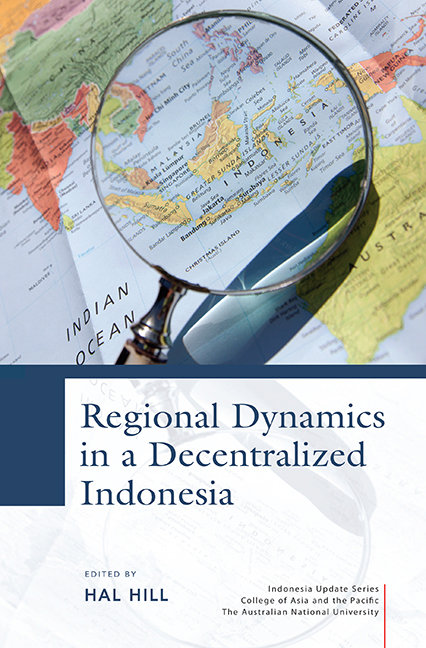Book contents
- Frontmatter
- Dedication
- Contents
- Tables
- Figures
- Contributors
- Acknowledgments
- Glossary
- Map of Indonesia
- 1 An introduction to the issues
- PART 1 HISTORICAL, ECONOMIC, POLITICAL AND SOCIAL PATTERNS
- PART 2 DECENTRALIZATION AND GOVERNANCE
- PART 3 LOCAL-LEVEL PERSPECTIVES
- PART 4 MIGRATION, CITIES AND CONNECTIVITY
- 13 Migration patterns: people on the move
- 14 Regional labour markets in 2002–12: limited convergence but integration nonetheless
- 15 The dynamics of Jabodetabek development: the challenge of urban governance
- 16 Challenges of implementing logistics reform in Indonesia
- PART 5 CHALLENGES FOR INDONESIA'S PERIPHERY
- Author index
- Subject index
- INDONESIA UPDATE SERIES
15 - The dynamics of Jabodetabek development: the challenge of urban governance
from PART 4 - MIGRATION, CITIES AND CONNECTIVITY
Published online by Cambridge University Press: 21 October 2015
- Frontmatter
- Dedication
- Contents
- Tables
- Figures
- Contributors
- Acknowledgments
- Glossary
- Map of Indonesia
- 1 An introduction to the issues
- PART 1 HISTORICAL, ECONOMIC, POLITICAL AND SOCIAL PATTERNS
- PART 2 DECENTRALIZATION AND GOVERNANCE
- PART 3 LOCAL-LEVEL PERSPECTIVES
- PART 4 MIGRATION, CITIES AND CONNECTIVITY
- 13 Migration patterns: people on the move
- 14 Regional labour markets in 2002–12: limited convergence but integration nonetheless
- 15 The dynamics of Jabodetabek development: the challenge of urban governance
- 16 Challenges of implementing logistics reform in Indonesia
- PART 5 CHALLENGES FOR INDONESIA'S PERIPHERY
- Author index
- Subject index
- INDONESIA UPDATE SERIES
Summary
INTRODUCTION
Recent urban development in many Asian countries has been marked by the physical growth of cities, radiating from the centre in all directions and spilling over beyond their formal administrative boundaries. This development has been characterized by a mixture of many different kinds of land uses and economic activities, including the appearance of new towns and large housing and industrial estates alongside existing agricultural activities. This phenomenon, often referred to as ‘mega-urbanization’, has occurred in many Asian countries, including Indonesia, China, India, Malaysia and Vietnam.
In earlier research (Firman 2009), I have identified seven characteristics of mega-urbanization in Indonesia:
1 development of economic activities on a global scale;
2 division of functions between the core and the outskirts of large cities;
3 change from single-core to multi-core urban areas;
4 land-use change in the city centre and conversion of farmland to urban uses on the outskirts;
5 large-scale urban infrastructure development;
6 greatly intensified use of space; and
7 considerable increases in commuter numbers and commuting times.
Over the past decade, the development of Indonesia's mega-urban regions has also reflected the urban fragmentation resulting from the new decentralization policy implemented since 2001 (Firman 2008, 2009).
One of the biggest challenges in mega-urban development is how to build an appropriate mechanism of governance that can optimize the potential of an urban region to improve its competitiveness and the quality of life of its residents. Governance includes the power exercised not only by formal government institutions, but also by civil society and the private sector. Against this backdrop, this chapter examines mega-urbanization in the greater Jakarta metropolitan area, which has the country's largest concentration of economic activities and urban population, and the governance systems that could be used to manage urban development in the region. In addition, the chapter will update my earlier research on the development of the greater Jakarta area (Firman 2004, 2008, 2009, 2010).
The greater Jakarta area consists of the city of Jakarta and the surrounding metropolitan area, including Bogor, Depok, Tangerang and Bekasi – hence its acronym Jabodetabek, consisting of the first two or three letters of each region.
- Type
- Chapter
- Information
- Regional Dynamics in a Decentralized Indonesia , pp. 368 - 385Publisher: ISEAS–Yusof Ishak InstitutePrint publication year: 2014



